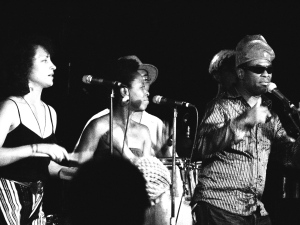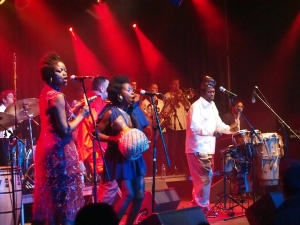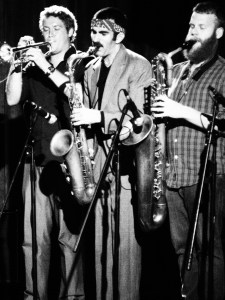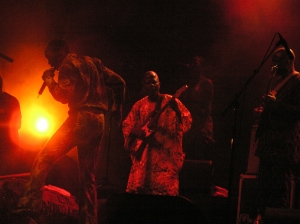I’m excited to be returning to WOMAD Taranaki, New Zealand, following a two year absence since moving to New York City. Having been energetically following and promoting the local music scene (www.sometimeinlongislandcity.com) the EarthSouNZ brand is re-energising and will be writing about, photographing and podcasting musicians on the world stage.
This edition looks at Afrobeat, its presence in New York City, and the American band “Antibalas” (www.antibalas.com ), who will be appearing at WOMAD Taranaki (www.womad.co.nz) this year.
Afrobeat in New York
New York is a melting pot of different cultures and this is represented in the music scene here, although not as much as I expected. Yes, there are Hispanic bands, and street musicians; and some West African musicians who make more money playing on the subway platforms that in concerts, clubs and bars. I have been struck by local enthusiasm for Afrobeat bands. Whether led by African musicians like Leon Kaleta Ligan-Majek (who once played with Fela Kuti and now fronts Akoya Afrobeat and Kaleta-Zozo Afrobeat –www.zozoafrobeat.com) or by non-Africans who just love the music. Check out Brooklyn band Zongo Junction (http://zongojunction.net) and what is probably the most famous US Afrobeat band Antibalas, who I’m featuring in this edition of EarthSouNZ..
The musical “Fela” may have had some influence in the revival of a brass-led style that has its origins in the Nigerian political Jazz-funk created by Fela Anikulapo Kuti, the pioneer of an actively political “modern” African music that found a ready audience in Europe in the early 1970s and which tested the tolerance of a corrupt Nigerian government.
A hard driving stage presentation of Fela’s life, this Broadway musical has played across America and in the UK since its first performances in 2008, drawing regular and local musicians to play in the house band that stays on stage for the whole of the show. Well before “Fela”, Brooklyn-based Afrobeat band “Antibalas” had been playing to enthusiastic audiences in the US and overseas as leaders of what has become known as the “second wave” of Afrobeat music. They formed the nucleus of the “Fela” house band for its preliminary workshops and subsequent productions, enjoying the stimulus the musical gave to Afrobeat music and to their own continued development as a band.
Antibalas will be appearing at WOMAD Taranaki this year in their second visit to New Zealand. I interviewed their founder Martín Perna to talk about the band’s origins and their experience touring in the Southern Hemisphere.
Antibalas
The band’s name means “bulletproof” in Spanish , (antiballistic, get it?), and is the top US-based Afrobeat band. Founded by sax player Martín Perna in 1998 as a horn-heavy band of mixed genres they moved in the Afrobeat direction very quickly and now have a big following in the US and Europe, with overseas tours to SE Asia and Australasia. I talked to Martín about the band, their origins and their experiences n New Zealand.
Antibalas was formed in 1998 when Martín pulled together a group of musicians he knew who were good players who understood Afrobeat and other genres. After a couple of years of playing their mix of Latin Funk and Fela-style jams they began to specialise.
“We really started to come together when we were given a residency at the “No Moore” club in downtown New York, the Tribeca district. We were able to develop a really big following there, it was a lot of work as we had to bring a big chunk of the sound system and we were a band of between 14 and 17 players. We were doing at least three gigs a week, including our Friday night residency, which allowed us to get a lot better, a lot faster. We did this for a couple of years but in April 2001 the club was shut down for fire danger reasons in Mayor Giuliani’s no compromise safety campaign, but this may have been more to do with wealthy neighbours wanting quiet evenings. Then a few months later there was 9/11; downtown Manhattan became deserted, people were traumatised and New York nightlife was crushed for a long time.
“So in the meantime we built up our own venue, the “Afrospot”, in some street level premises in Brooklyn that was rented by our then singer, Amayo, who had his own African themed design and tailoring business. We were also able to build the first Daptone recording studio in the basement (http://www.daptonerecords.com), a project that has gone on to record Sharon Jones and the Dap Kings (who were big favourites at WOMAD Taranaki 2008).
“This site lasted for less than two years, but we got a lot done in that time in terms of recording and rehearsal, which was a good base for our touring schedule; this grew significantly when one of our members took some recordings to WOMEX (the world music industry fair) in Germany and set up bookings across Europe. People were into the music, but the logistics were difficult with such a big band, 14 going on their first tour to England with uncertain bookings, transport and lodging. I used my savings to bankroll the band’s travel initially, but we still had to be very creative, travelling in trucks and going from record shop to record shop selling our 45s; even asking in a BBC interview for people to take us home after the show!
“Europe was fertile ground for Antibalas, with DJs like Gilles Peterson promoting a wide range of musical genres, especially from West Africa. People were listening to old Fela Kuti records but there was really no Afrobeat being played live. The British colonial history made for a natural link with Anglophone Africa, especially with the immigration from that region into the UK; and the French, with their African colonial history, caught on too. We’ve been going to France for just as long as the UK, and that audience is getting bigger. We’ve have also toured festivals in Turkey, Switzerland, Germany and Denmark; Europe has a lot of resources so we’re not so poor these days, and have proper transport and places to stay.”
WOMAD
World Of Music Arts and Dance was created by Peter Gabriel, Thomas Brooman and Bob Hooten in 1980 with their first festival in 1982 featuring a range of musicians, artists and dancers; including the Drummers of Burundi and a Chinese Orchestra.
“Pure enthusiasm for music from around the world led us to the idea of WOMAD in 1980 and thus to the first WOMAD festival in 1982. The festivals have always been wonderful and unique occasions and have succeeded in introducing an international audience to many talented artists.”
“Equally important, the festivals have also allowed many different audiences to gain an insight into cultures other than their own through the enjoyment of music. Music is a universal language, it draws people together and proves, as well as anything, the stupidity of racism.” Peter Gabriel
Antibalas have played WOMAD in the Canary Islands and the UK, but this is their first excursion to WOMAD in the Southern Hemisphere. Along with Womadelaide and Taranaki they are playing gigs around Australia and in Noumea.
WOMAD Taranaki (www.womad.co.nz) , March 15-18, will be the band’s second visit to New Zealand having previously played in Wellington at the NZ Festival of the Arts (2010) on a tour that included dates in Australia where they played at other festivals, including one featuring NZ band “Fat Freddys Drop” (www.fatfreddysdrop.com), another innovative brass led group who have mixed roots music with jazz and soul.
Martín remembers landing in Wellington and noticing how few people there were ( the population of New Zealand is about the same as Brooklyn in New York). “It felt very intimate and very peaceful. There are so many resources and not too many people crawling over themselves to get to them. At customs I was worried about them quarantining our drums, but in the end they just took one drum, a souvenir rather than a band instrument. I respected this and understand the need to protect the environment.”
“I really liked the Maori welcome we had in Wellington, a full greeting, respecting the relationship with the place and their ancestors and also recognising that we had travelled so far. That has never happened anywhere else in the world.”
The Band on this trip will be baritone and tenor Saxophones, trumpet, trombone, two guitars, bass, drums, keyboard and two percussion, one of whom is the main vocalist. Having only been in NZ for 32 hours on their first trip, Martín is looking forward to being able to stay longer this time and plans to travel after WOMAD, maybe to Hawkes Bay.
Although the he is the band’s founder Martín sees the group as more of a collective, each member having their own strengths. Whilst the membership has changed over the years there is still a commitment to strong musicianship.
Do you think that the musical “Fela” has brought Afrobeat back into popularity?
“I think more people know about Fela as a man and musician, but I don’t think that this has given Afrobeat a new audience, they’re not really going to hear bands. We’ve had gigs around the touring musical but really the crowds were no bigger than we would have expected. It has never got any easier for the band, we don’t fit into an established scene; we’re not part of the American musical DNA.”
Do you think there are aspects of Afrobeat that are difficult for people? After all it’s not just highly rhythmic and melodic music, it’s also angry and political.
“I think so, we all live in these bubbles of privilege that have sometimes been created out of injustice. Many of the band come from backgrounds in which injustice has been significant, so the messages that are in our music are part of our lived experience. Stirring it up can make people feel uncomfortable; it’s not an “everything’s going to be OK” music. It can force you to consider where you stand in relation to the power that you have.”
Some people say that being able to dance to this music cheapens it, dilutes the message.
“Just because you can dance to the music, it doesn’t mean that the message isn’t important. Movement is important in political change, if you can’t move on the dance floor there’s no way you would be able to make change on the streets. A lot of people need to shake off the protestant position that dancing is somehow shameful and use dance movement to express themselves.”
Do you think that political music like this has a role on the American, or even the Western political scene?
“Music creates a space for ideas to generate away from the one-way communication echo chamber that the traditional news media promote. We play our part in something that’s a lot bigger, and it’s important that we do it.”





